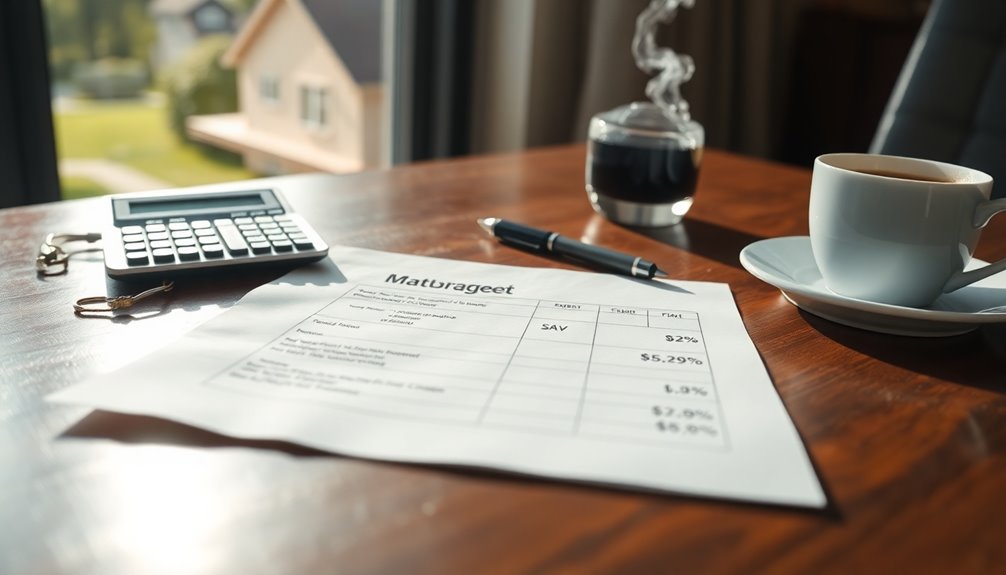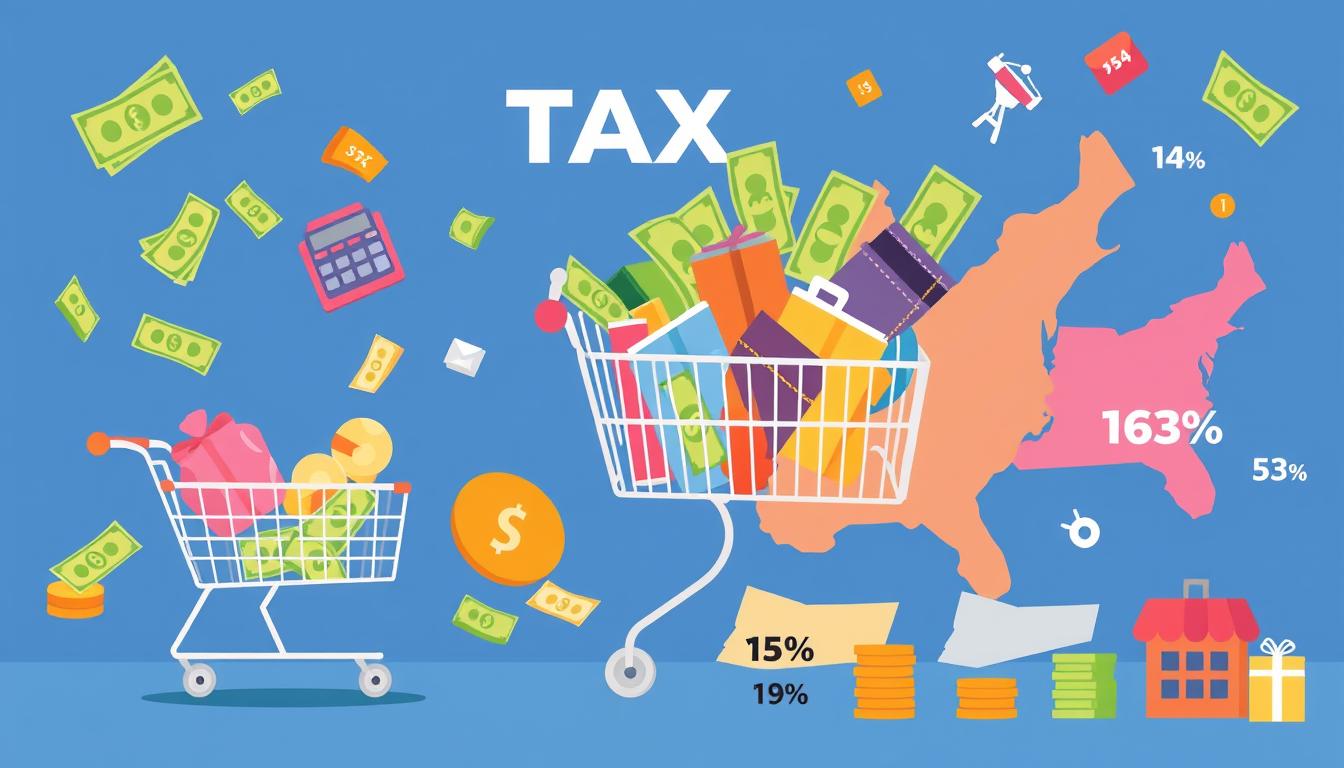Yes, taxes are often included in your mortgage payments. When you pay your mortgage, you're typically covering four components: principal, interest, taxes, and insurance, collectively known as PITI. Many lenders require you to set up an escrow account for property taxes, allowing them to manage these payments on your behalf. They collect a portion of your monthly payment, which goes into the escrow account to cover your property tax bills. This setup simplifies budgeting by spreading your tax payments over the year. There's more to know about how this works and what it means for your finances.
Key Takeaways
- Property taxes are often included in monthly mortgage payments through an escrow account managed by the lender.
- Monthly mortgage payments consist of principal, interest, taxes, and insurance (PITI).
- Lenders require escrow accounts for conventional loans with less than 20% down payment to cover property taxes.
- Homeowners may also choose voluntary escrow accounts to simplify budgeting for taxes and insurance.
- Lenders conduct annual analyses of escrow accounts to identify any shortages or surpluses related to property tax payments.
Understanding Mortgage Payments

Understanding your mortgage payments is crucial for effective financial planning, especially when it comes to budgeting for homeownership. Your mortgage payment typically consists of four main components: principal, interest, taxes, and insurance—often referred to as PITI.
The principal is the amount you borrow to purchase your home. Initially, a small part of your monthly payment goes toward paying down this principal. Over time, as you continue to make payments, this portion increases, helping you build equity in your home.
Interest is the cost of borrowing money and varies based on your loan balance and interest rate. In the early stages of your mortgage, a larger chunk of your payment goes toward interest rather than principal.
Property taxes are assessed by your local government and can be included in your monthly mortgage payment. If your lender requires it, these taxes may be divided into equal monthly payments, which are often held in an escrow account. Escrow accounts help ensure timely property tax payments, reducing the risk of penalties due to missed payments.
Lastly, homeowners insurance protects your property from various hazards and may also be factored into your monthly mortgage payment, ensuring you're financially prepared for homeownership.
Role of Escrow Accounts

Escrow accounts play a vital role in managing your mortgage payments by collecting funds for property taxes and insurance. When you make your monthly mortgage payment, a portion goes into this account, ensuring that these essential expenses are covered without you needing to worry about them. These accounts help reduce risk for lenders by guaranteeing that property taxes and insurance premiums are paid on time. If you have a conventional loan with less than a 20% down payment or a government-backed mortgage, having an escrow account is mandatory.
The lender conducts an annual analysis of the account, notifying you of any shortages or surpluses, while also adhering to regulations like RESPA to protect your interests. If you encounter a shortage, your monthly payments might increase, but any surplus over $50 will be refunded to you. Mortgage escrow accounts ensure timely payments of property taxes and insurance, allowing homeowners to focus on other financial responsibilities.
Escrow accounts simplify budgeting by spreading these costs over monthly payments, making it easier to manage your finances. Plus, if you choose to set up an escrow account voluntarily, it can streamline your payment process even further, ensuring compliance with tax and insurance requirements while avoiding penalties.
Property Tax Components

When it comes to property taxes, several key components determine how much you'll ultimately pay.
First, the taxable assessment is crucial. This value is set by your local assessor and is calculated by taking the assessed value of your property minus any exemptions. Keep in mind that this assessment may change annually based on local regulations.
Next, the property tax rate plays a significant role. Expressed as a percentage per $1,000 of assessed value, this rate is calculated by dividing the tax levy by the total taxable assessed value of all properties in your jurisdiction. It can vary widely, depending on local budgets and revenue needs.
The tax levy itself is derived from the budget developed by your taxing jurisdiction, which includes various revenue sources like state aid and sales tax. The difference between the total budget and non-property tax revenues gives you the tax levy amount that needs to be raised from property owners like you. Additionally, many homeowners opt for an escrow account to manage their property taxes more conveniently within their monthly mortgage payments.
Lastly, remember that all these components can be influenced by annual changes in budgets, revenue sources, and assessments, which means your property tax bill mightn't stay the same year after year.
Tax Deductibility Overview

Navigating the tax implications of your mortgage can be crucial for maximizing your financial benefits. The mortgage interest deduction is a key factor here, available to taxpayers who choose to itemize their deductions. This deduction applies to interest paid on loans up to $750,000 for your primary or secondary residences. If you're married and filing separately, the limit drops to $375,000.
Additionally, if you take out a home equity loan for renovations or improvements, that interest may also be deductible. However, the Tax Cuts and Jobs Act (TCJA) has changed the landscape. It reduced the maximum deductible mortgage principal from $1 million to $750,000 and altered home equity loan treatment. With the increased standard deduction, itemizing may not be beneficial for everyone. In fact, high-income taxpayers tend to benefit the most, as fewer lower-income individuals claim this deduction.
Moreover, the TCJA aimed to limit the deduction's scope and enhance tax revenue, concentrating benefits among high-income taxpayers. To claim the deduction, you'll report it on Form 1098 and Schedule A or E, depending on the situation. If you co-own a property, you can deduct interest proportionally based on your ownership.
Calculating Property Taxes

Understanding how property taxes are calculated is vital for homeowners, especially since these taxes can significantly impact your overall housing costs.
The first step in calculating your property taxes is determining the assessed value of your home. This value is usually a percentage of the taxable value, often calculated by multiplying the taxable value by 35%. For example, if your property has a taxable value of $200,000, your assessed value would be $70,000.
Once you have the assessed value, you can apply the tax rate to it. Tax rates vary by location and can be expressed as a percentage or in mills. For instance, if your assessed value is $70,000 and the tax rate is 0.029218, your property tax would amount to approximately $2,045.26. Additionally, it's important to note that property tax caps can limit how much taxes increase annually, providing some relief for homeowners.
Keep in mind that tax rates can change annually, and some jurisdictions impose tax caps that limit how much property taxes can increase each year.
In cases of new construction, however, the full rate applies immediately. Understanding these calculations helps you budget effectively for your housing expenses.
Impact of Tax Changes

How have recent tax changes reshaped the landscape for homeowners? The Tax Cuts and Jobs Act (TCJA) significantly altered the benefits of homeownership. With the standard deduction doubling, many homeowners now find it more advantageous not to itemize their deductions. Consequently, the number of households claiming the mortgage interest deduction plummeted from 31% in 2017 to just 11% in 2018. Additionally, the cap on state and local tax (SALT) deductions at $10,000 further disincentivizes itemization. For those who still itemize, the TCJA reduced the deductible mortgage debt limit from $1 million to $750,000 for new mortgages. Furthermore, interest on home equity loans is only deductible when used for specific purposes, diminishing its appeal.
While these changes affected higher-income households the most, the overall impact on home prices was minimal, with only a 0.10% change noted between 2017 and 2019. Moreover, homeowners became more sensitive to refinancing opportunities, especially when mortgage rates were low, but the reduction in interest deduction diminished the incentive to refinance. The transition from itemizing to standard deduction kept more money in taxpayers' pockets, helping them manage their mortgage costs more effectively.
Managing Property Tax Payments

Managing property tax payments can feel overwhelming, but it doesn't have to be. When you finance a home, property taxes are often included in your monthly mortgage payment through an escrow account. This means your lender calculates the annual property tax amount, divides it by 12, and adds that monthly escrow payment to your principal and interest. This combination forms your total mortgage payment, known as PITI (Principal, Interest, Taxes & Insurance).
To ensure your escrow account remains adequately funded, lenders typically require a cushion of two months' worth of payments. They also conduct an annual review to check for any shortages or surpluses. If there's a shortage, you might need to pay extra or increase your monthly payment. If there's an overage, you'll receive a check for that amount.
You have several payment options for property taxes, including cash, checks, and online methods. Be mindful of potential convenience fees when using credit or debit cards. Always include your parcel ID or property address with mailed payments, and consider using drop boxes for added convenience. Additionally, payments can be made via drop boxes located outside five tag offices for secure submission.
This way, managing your property tax payments can be more straightforward and less stressful.
Budgeting for Property Taxes

Budgeting for property taxes is essential for homeowners to avoid unexpected financial strain. In California, your property taxes are based on the base year value, typically the purchase year, with increases capped at 2% annually. Each county sets its own tax rate, which can vary, so it's crucial to check local rates and any additional charges that might be included in your tax bill.
To prepare for future increases, estimate your annual property tax bills by multiplying the current base year value by 2% and adding the current tax rate. Review historical data for trends in tax rate increases and property valuations, and consider local economic conditions that could affect assessments. It's wise to set aside a budget cushion for these anticipated increases. Additionally, having knowledge of your base year value can significantly aid in predicting future tax increases.
If you have an escrow account, your property taxes are included in your monthly mortgage payments, making management easier. However, if you're paying directly, ensure you're ready for those annual or semi-annual payments.
Don't forget to explore tax relief options, like exemptions or programs for seniors, which can help reduce your overall tax burden.
Frequently Asked Questions
Can I Opt Out of Escrow for Property Taxes?
Yes, you can opt out of escrow for property taxes, but it depends on your loan type and lender's policies.
If you have a conventional loan with at least a 20% down payment or significant equity, you might be eligible.
You'll need to request an escrow waiver, and if approved, you'll pay property taxes directly.
Just remember to save enough to cover those bills when they're due to avoid financial strain.
How Do Property Tax Increases Affect Loan Eligibility?
Property tax increases can significantly impact your loan eligibility.
Lenders look at your debt-to-income ratio, which includes property taxes, when evaluating your application. If property taxes rise sharply, it could push your ratios above acceptable limits, making it harder to qualify for a loan.
You might need to reassess your budget or consider homes in lower-tax areas to improve your chances of securing financing and maintaining affordability.
Are Property Taxes Included in Refinancing Calculations?
When you refinance, property taxes aren't directly included in the calculations.
Your lender focuses on your loan terms, credit score, and income, not your property tax amount.
However, if you make significant changes to your home, that could lead to a reassessment and potentially impact your property taxes.
It's wise to keep this in mind when planning renovations, as those could indirectly affect your financial situation after refinancing.
What Happens if My Property Tax Bill Is Late?
If your property tax bill is late, you'll face penalties and interest.
Typically, a 10% penalty kicks in on each installment in California, along with additional costs. Interest can accumulate at 1.5% per month on unpaid taxes.
A lien could be placed on your property, and if you don't pay, it could eventually be sold at auction.
To avoid these issues, make sure your payments are on time or consider a payment plan.
Can Property Taxes Be Included in a Home Equity Loan?
You can't include property taxes in a home equity loan itself.
Instead, home equity loans are separate from your primary mortgage, which may manage property taxes through an escrow account.
However, if you use a home equity loan for renovations, your property taxes might increase due to the added value.
Always check your loan documents for details on any specific terms related to property taxes and home equity loans.
Conclusion
In conclusion, understanding how taxes fit into your mortgage is crucial for effective budgeting. While property taxes aren't directly included in your mortgage payment, they're often managed through escrow accounts. Staying informed about your tax obligations and potential changes can help you avoid surprises down the road. By planning ahead and factoring in these costs, you'll be better prepared for homeownership and ensure your financial stability remains intact.









